Society of Scholars Inducts New Members
The Society of Scholars was created on the
recommendation of then President Milton S.
Eisenhower and approved by the board of trustees on May 1,
1967. The society — the first of its kind in
the nation — inducts former postdoctoral fellows,
postdoctoral degree recipients and junior or visiting
faculty who have served at least a year at Johns Hopkins
and thereafter gained marked distinction
elsewhere in their fields of physical, biological, medical,
social or engineering sciences or in the
humanities, and for whom at least five years have elapsed
since their last Johns Hopkins affiliation.
The Committee of the Johns Hopkins Society of Scholars,
whose members are equally distributed
among the academic divisions, elects a limited number of
scholars from the candidates nominated by
the academic divisions with postdoctoral programs.
The scholars elected in 2008 will be invested at a
ceremony hosted by Provost Kristina M.
Johnson at 5 p.m. on Wednesday, May 21, at Evergreen Museum
& Library. At that time, the new
members will each receive a certificate and a medallion on
a black and gold ribbon to be worn with
academic regalia. The induction, which brings to 521 the
total number of members in the Johns
Hopkins Society of Scholars, will be followed by a dinner
hosted by President William R. Brody. The
new members will be recognized at
Commencement on May 22.
The following listing of the 2008 Society of Scholars
members includes a short description of
their accomplishments at the time of their election to the
society.

Mary D. Barkley, Cleveland
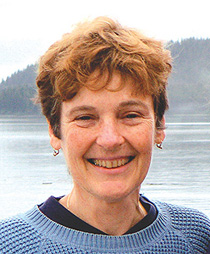
Mary Barkley
|
A visiting professor in the Krieger School's
Department of Biology in 1980-81, Mary Barkley is
now a recognized leader in biophysical chemistry. As the M.
Roger Clapp University Professor of Arts
and Sciences at Case Western Reserve University, she
investigates the structure and dynamics of
biological macromolecules, believing that a better
understanding of protein function will lead to
improved drug therapies. In particular, her research on the
flexibility of DNA has led to computation
studies and new physical measurements. Barkley's current
work on the AIDS and hepatitis C viruses is
having a major impact in the field. She has actively
participated in the Biophysical Society and has
been instrumental in identifying and promoting young
scientists and increasing the scientific
awareness of government representatives.
Nominator: Ludwig Brand, professor, Department of
Biology, Krieger School of Arts and Sciences

Arthur L. Beaudet, Houston

Arthur Beaudet
|
Now considered a pioneer in the applications of
molecular genetics to human disease, Arthur
Beaudet was an intern and resident in the School of
Medicine's Department of Pediatrics from 1967 to
1969. From there, he has proceeded to develop and lead one
of the most successful human genetics
programs in the world. His accomplishments include key
discoveries in several genetic disorders,
including Angelman syndrome, Prader-Willi syndrome and
autism. Beaudet's many honors include the
March of Dimes/Col. Harland Sanders Award for lifetime
achievement in genetic sciences. He is
currently the Henry and Emma Meyer Professor and chair of
the Department of Human and Molecular
Genetics at the Baylor College of Medicine.
Nominator: Aravinda Chakravarti, professor of
medicine, pediatrics, and molecular biology and
genetics, and director of the Center for Complex Disease
Genomics, School of Medicine

Lisa A. Carey, Chapel Hill, N.C.
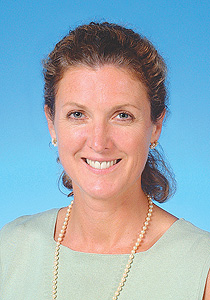
Lisa Carey
|
Lisa Carey is an associate professor of medicine and
director of the multidisciplinary University
of North Carolina Breast Cancer Center. She has worked
closely with colleague Charles Perou to
harness the power of microarray technology for recognizing
and tailoring treatment for molecular
subtypes of breast cancer. Carey's study was described in a
2006 Journal of the American Medical
Association article, which is one of the highest impact
articles on breast cancer and health disparities
published to date. She is the principal investigator of a
large-scale multi-institutional trial to test new
treatments for a basal subtype of breast cancer. From 1990
to 1997, she was a resident in the School
of Medicine's Department of Internal Medicine and a fellow
in Oncology.
Nominator: Saraswati Sukumar, the Barbara B.
Rubenstein Professor of Oncology and co-director of
the Breast Cancer Program, Sidney Kimmel Comprehensive
Cancer Center, School of Medicine

David C. Kaslow, North Wales, Pa.
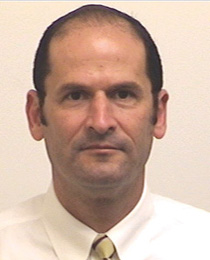
David Kaslow
|
A fellow in the School of Medicine's Division of
Pediatric Genetics from 1984 to 1986, David
Kaslow is currently vice president in the Division of
Infectious Diseases and Vaccines at Merck
Research Laboratories. Driven by his interest in the impact
of malaria on global health, Kaslow
founded the Malaria Vaccine Development Unit at the
National Institutes of Health. He has applied
tools originally created for gene therapy to vaccine
development. Major contributions include the
molecular cloning and characterization of proteins involved
in the sexual development of the malaria
parasite and development of several malarial vaccines.
Kaslow also directed the research and product
development that led to clinical trials for vaccines
against anthrax, West Nile virus, influenza, HIV
and cancer.
Nominator: Barbara A. Migeon, professor of
pediatrics/general medicine, McKusick-Nathans Institute
of Genetic Medicine, School of Medicine

Muin J. Khoury, Atlanta
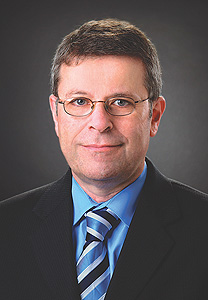
Muin Khoury
|
Trained in both medicine and epidemiology, Muin Khoury
was an assistant professor in the
School of Public Health's Department of Epidemiology in
1986. During a distinguished career, Khoury
has championed the field of public health genetics and the
application of genomics to public health
issues. Among the early genetic epidemiologists, he
authored one of the first comprehensive
textbooks on the subject, Fundamentals of Genetic
Epidemiology. Beyond his many substantive
research contributions, Khoury has led initiatives on
genetics at the Centers for Disease Control and
Prevention, serving since 1999 as the founding director of
CDC's National Office of Public Health
Genomics. He has used his role as a platform to advance the
field of public health genetics within CDC
and beyond. His accomplishments in this regard include the
development of a key series of reviews on
the genetics of human disease, the organization of numerous
conferences to advance the field and a
steady stream of scholarship on the topic, including the
book Human Genome Epidemiology.
Nominator: Jonathan M. Samet, professor and chair,
Department of Epidemiology, Bloomberg School
of Public Health

Andrzej Kowalczyk, Torun, Poland
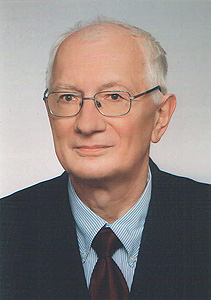
Andrzej Kowalczyk
|
Andrzej Kowalczyk is a major contributor in medical
physics whose career was influenced by
collaboration with physicians at the Johns Hopkins Medical
Institutions. Trained in photophysics,
Kowalczyk was a postdoctoral fellow in the Krieger School's
Department of Biology in 1980-81. While
at Johns Hopkins, he collaborated with colleagues in the
School of Medicine to use fluorescence
spectroscopy to study respiratory distress syndrome. This
experience completely changed the
direction of his research efforts. After returning to his
native Poland, Kowalczyk became professor of
physics at the Nicholas Copernicus University. He
subsequently founded and now directs the medical
physics group at the university's Institute of Physics.
Kowalczyk has developed new optical methods
for medical diagnosis, including techniques that use
optical coherence tomography in ophthalmology.
Nominator: Ludwig Brand, professor, Department of
Biology, Krieger School of Arts and Sciences

Elizabeth J. Perlman, Chicago
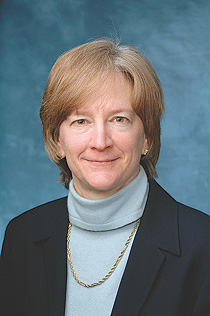
Elizabeth Perlman
|
Pathologist in chief and head of the Department of
Pathology at Children's Memorial Hospital in
Chicago, Elizabeth Perlman is known internationally for her
expertise in pediatric kidney tumors. Her
genetic analyses of pediatric germ cell tumors have
identified how they differ from adult tumors and
have found distinct genetic subgroups within the pediatric
primary germ cell tumors originating in the
chest. Her ongoing research on pediatric renal tumors has
shown that using molecular analyses can
result in increasingly precise classification that will
affect treatment decisions and outcomes. In 1999,
the Society of Pediatric Pathology awarded Perlman its
Harry B. Neustein Memorial Award in
recognition of her research. Perlman received her
postgraduate training in pathology and laboratory
medicine from 1984 to 1990 at Johns Hopkins' School of
Medicine.
Nominator: Constance A. Griffin, associate
professor, Department of Pathology, and interim director,
Division of Molecular Pathology, School of Medicine

Sally Perreault Darney, Research Triangle Park,
N.C.
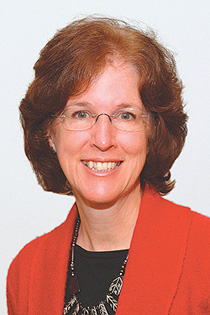
Sally Perreault Darney
|
After completing a postdoctoral fellowship in 1984 in
the Division of Reproductive Biology,
Department of Population Dynamics, in the School of Public
Health, Sally Perreault Darney joined the
Environmental Protection Agency's Office of Research and
Development. There she was charged with
three tasks: to develop a research program to address modes
of action of reproductive toxicants on
sperm, eggs and fertility; to help craft EPA's Reproductive
and Developmental Risk Assessment
Guidelines; and to help revise multigenerational test
guidelines. Since that time, she has completed
those tasks and more, holding leadership positions of
increasing responsibility at the agency, including
chief of the Gamete and Early Embryo Biology Branch,
director of the Reproductive Toxicology Branch
and her current role as acting national program director
for human health. Perreault Darney's
research program has helped set both national and
international research agendas and has had a
significant impact on reproductive test guidelines and risk
assessment paradigms, with a recent focus
on emerging issues that include environmental endocrine
disruptors, assessment of complex exposures
and extrapolation of data from rodent to human.
Nominator: Barry R. Zirkin, professor and director,
Division of Reproductive Biology, Department of
Biochemistry and Molecular Biology, Bloomberg School of
Public Health

Kornelia Polyak, Boston
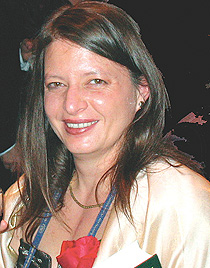
Kornelia Polyak
|
A research associate in the Kimmel Cancer Center and
Howard Hughes Medical Institute from
1995 to 1998, Kornelia Polyak is presently an associate
professor of medicine at the Dana-Farber
Cancer Institute of the Harvard Medical School. She is at
the forefront of studies using genomic
approaches to study human breast cancer, with particular
emphasis on early-stage disease. She has
been a pioneer in developing and applying several new
methods to survey the human breast cancer
genome, and her lab has identified specific oncogenes and
tumor suppressor genes that play a role in
breast cancer progression. The recipient of numerous
awards, Polyak is especially well-known for her
contributions in the interplay between genetic and
epigenetic alterations in the tumor and its
microenvironment.
Nominator: Nancy E. Davidson, professor of oncology,
Breast Cancer Research Chair in Oncology and
director of the Breast Cancer Program, Sidney Kimmel
Comprehensive Cancer Center, School of
Medicine

Stephen J. Qualman, Columbus, Ohio
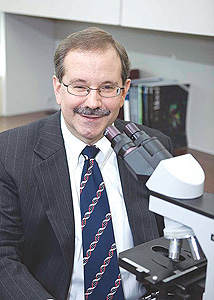
Stephen Qualman
|
With a long-standing interest in pediatric tumors,
Stephen Qualman is a national authority on
the pathology of childhood cancer. His singular
contribution to medical research has been the
establishment in 1991 of the Biopathology Center of the
Cooperative Human Tissue Network. From a
small beginning, Qualman's subsequent research convinced
the National Cancer Institute of the value
of providing pediatric tumor specimens to medical
researchers. He has proceeded to develop the
premier tumor repository in the country, expanding the
center to include the Children's Cancer Group
Biopathology Center, the Childhood Survivor Study Pathology
Center and, since 2000, seven additional
tumor banks. On average, the Biopathology Center annually
distributes 15,000 biospecimens to
approximately 200 researchers. At Johns Hopkins, Qualman
was an intern and resident in the School
of Medicine's Department of Pathology from 1979 to 1983.
Today, he holds the Richard M. and M.
Elizabeth Ross Endowed Chair in Pediatric Research and is
vice chair of the Pediatric Pathology Branch
at the Columbus Children's Research Center.
Nominator: Michael J. Borowitz, professor of
pathology and oncology and deputy director, Department
of Pathology, School of Medicine

John Joseph Ricotta, Stony Brook, N.Y.
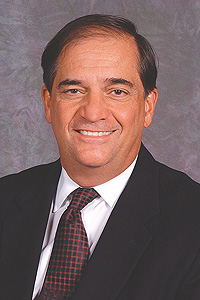
John Ricotta
|
John Ricotta is an internationally and nationally
known vascular surgeon who received his
postdoctoral medical training in the School of Medicine's
Department of Surgery from 1973 to 1980.
A true scholar, he is considered a world authority on the
treatment of combined carotid and coronary
disease and is a leader in the area of carotid stent
trials. In his career thus far, Ricotta has trained
24 residents in his research lab as well as 15 vascular
surgery fellows. He has been invited as a visiting
professor to numerous institutions around the country and
has served as president of the Eastern
Vascular Society, the Society for Clinical Vascular Surgery
and the Western New York Vascular
Society. A member of the American Board of Surgery, Ricotta
is currently professor and chair of the
Department of Surgery and program director of General
Surgery at the School of Medicine and
Biomedical Sciences at the State University of New York at
Stony Brook.
Nominator: Julie A. Freischlag, the William Steward
Halsted Professor in Surgery and chair of the
Department of Surgery, School of Medicine

Robert A. Rizza, Rochester, Minn.
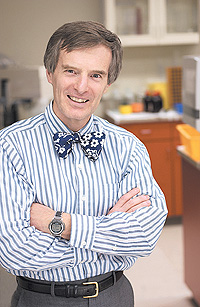
Robert Rizza
|
Since completing his internship and residency in the
School of Medicine's Department of
Medicine in 1976, Robert Rizza has focused his research
efforts on investigating glucose metabolism
in diabetic and nondiabetic individuals. His work has
resulted in groundbreaking scientific
contributions, including an increased understanding of how
specific hormones, substrates, insulin
delivery routes and medical conditions regulate insulin
action and glucose metabolism. Rizza has
defined the mechanisms the human body uses to defend
against and recover from hypoglycemia. He
has developed practical approaches and tested the
effectiveness of "intensive insulin therapy," now
considered by many to be the standard of care for type 1
diabetes, and has also provided new insights
into the mechanisms of existing and novel therapies for
type 2 diabetes mellitus. His goal is to
produce rational, effective methods for preventing and
treating diabetes mellitus and its associated
complications. Rizza is the Earl and Annette R. McDonough
Professor of Medicine and executive dean
and director of research at the Mayo Clinic College of
Medicine.
Nominator: Paul W. Ladenson, the John Eager Howard
Professor of Medicine and director of the
Division of Endocrinology and Metabolism, School of
Medicine

Shlomo Shinnar, Bronx, N.Y.
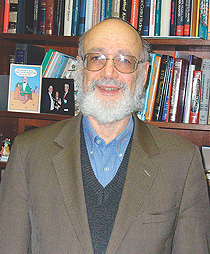
Shlomo Shinnar
|
After earning a doctorate in neurophysiology, Shlomo
Shinnar was an intern, resident and fellow
in the Department of Pediatrics and a resident and fellow
in the Department of Neurology, both in the
School of Medicine. He left Johns Hopkins in 1983 to embark
on what would become a distinguished
career in epilepsy research. Currently he is a professor of
pediatrics, epidemiology and population
health and the Hyman Climenko Professor of Neuroscience
Research at the Comprehensive Epilepsy
Management Center at the Montefiore Medical Center of the
Albert Einstein College of Medicine.
Shinnar's contributions to the body of knowledge of febrile
seizures and pediatric epilepsy have
changed our understanding and management of these
conditions and set the standard for
epidemiologic research in the field. A prolific author and
frequent lecturer, he is a leader in the field
of pediatric epilepsy, and at the Child Neurology Society
and the Epilepsy Branch of the National
Institutes of Health. The American Epilepsy Society has
honored his substantial work with its
Research Recognition Award.
Nominator: John M. Freeman, Lederer Professor of
Neurology and Pediatrics, School of Medicine

Peter S. Ungar, Fayetteville, Ark.
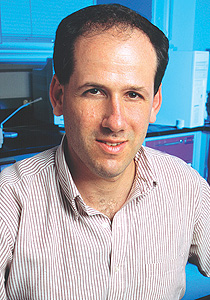
Peter Ungar
|
A young scholar who was a postdoctoral fellow in the
School of Medicine's Department of Cell
Biology and Anatomy in 1992-93, Peter Ungar has already
established himself as one of the top
physical anthropologists in the world. Now a professor of
anthropology at the University of Arkansas,
he has done paleontological fieldwork on virtually every
continent. He has also studied primate
behavior and ecology in Central and South America and
Indonesia. Ungar's research efforts are
focused on an improved understanding of the behavior of our
earliest ancestors. To make this
possible, he has pushed data analyses to new levels, using
techniques such as GIS analysis to plot fossil
sites in 3-D and creating new technologies, including the
combination of scanning confocal microscopy
and fractal analysis, to gain critical insights into the
origins and evolution of human diet. In the
process, Ungar has tested the assumptions underlying
present-day fossil interpretations and has
revolutionized our understanding of the mechanisms of human
evolution.
Nominator: Mark Teaford, professor, Center for
Functional Anatomy and Evolution, School of
Medicine

Teresa Lyn Wright, Pleasanton, Calif.
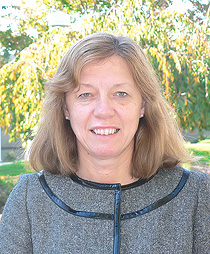
Teresa Wright
|
A noted expert on liver disease and viral hepatitis,
Teresa Wright is chief medical officer and
vice president of Roche Molecular Systems. As professor of
medicine at the University of California,
San Francisco and chief of the Gastroenterology Section at
the San Francisco Veterans
Administration Center, Wright was one of the first
physicians to alert the medical community to the
problem of hepatitis C infection among liver transplant
patients and individuals with HIV. In
recognition of her considerable achievements, she was
elected to the Association of American
Physicians in 2002. In that same year, Prince Andrew made
her an officer in the Order of the British
Empire for "her brilliant research in pioneering therapies
that have saved hundreds of lives." In 2005,
she was president of the American Association for the Study
of Liver Diseases. Wright was an intern
and resident in the School of Medicine's Department of
Medicine from 1979 to 1982.
Nominator: Susan M. MacDonald, professor and
associate chair, Department of Medicine, School of
Medicine
 GO TO MAY 19, 2008
TABLE OF CONTENTS.
GO TO MAY 19, 2008
TABLE OF CONTENTS.
 GO TO THE GAZETTE
FRONT PAGE.
GO TO THE GAZETTE
FRONT PAGE.
|